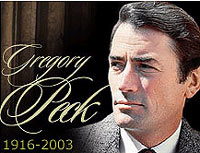 Oscar-winning actor Gregory Peck, one of the last of the great stars from Hollywood's golden era and a man who embodied on-screen heroism, died peacefully during the night at his Los Angeles home at the age of 87, his spokesman said on Thursday.
Oscar-winning actor Gregory Peck, one of the last of the great stars from Hollywood's golden era and a man who embodied on-screen heroism, died peacefully during the night at his Los Angeles home at the age of 87, his spokesman said on Thursday.
Spokesman Monroe Friedman said Peck's French-born wife of 48 years, Veronique Passani Peck, was at his side when he died.
"She told me he just died peacefully. She said she was holding his hand and he just closed his eyes and went to sleep and he was gone," Friedman said.
His death came less than a week after the American Film Institute paid tribute to him by naming his role as the idealistic Southern lawyer Atticus Finch in "To Kill a Mockingbird" as the greatest movie hero of all time. The role earned Peck his only Oscar for best actor in 1963.
A tall, lean and square-jawed sex symbol in his early years, Peck went on to become Hollywood's ideal example of moral strength and sincerity both in the movies and as a community activist.
The California-born actor, who once thought of becoming a priest, attended a military academy as a boy and his soldier-like bearing served him well in such roles as Captain Ahab of "Moby Dick," King David ("David and Bathsheba"), Gen. Douglas MacArthur ("MacArthur") and Abraham Lincoln (television's "The Blue and the Gray").
Rarely in his 52 films did he play anything but a "good guy," a notable exception being the Nazi villain in the popular "The Boys from Brazil" (1978).
Critics could be unkind. Pauline Kael of the New Yorker once labeled Peck "competent but always a little boring."
'Nicest Guy'
But John Huston, who directed Peck in "Moby Dick," echoed the comments of many in Hollywood when he praised the "superb dignity" of the actor's performances. "Greg is one of the nicest, straightest guys I ever knew, and there's a size to him," Huston wrote in his autobiography.
Peck, who also produced a number of movies, made big contributions as a civic leader in the film industry, serving as the founding chairman of the American Film Institute. In March 1987 he was among cultural and scientific luminaries invited to Moscow for then-Soviet leader Mikhail Gorbachev's forum "For a Nuclear-Free World and the Survival of Mankind."
A charter member of the National Arts Council, Peck was also a driving force behind the AFI and served from 1967 to 1970 as president of the Academy of Motion Picture Arts and Sciences, which later awarded him its Jean Hersholt Humanitarian Award.
In 1968, President Lyndon Johnson awarded Peck the Medal of Freedom, America's highest civilian award.
Asked once by an interviewer to sum up his career, Peck replied with typical reserve: "I enjoy practicing my craft as well as I possibly can. I enjoy the work for its own sake."
He was born in La Jolla, California, on April 5, 1916, and was given the name of Eldred Gregory Peck. His first name came from a telephone directory and was quickly dropped.
Peck entered St. John's Military Academy in Los Angeles at the age of 10. There he received discipline and large doses of Catholic training, and briefly considered becoming a priest.
Migrating to New York, he was a barker at the 1939 World's Fair and soon won a job on the stage. His first Broadway appearance, in 1942's "Morning Star," earned him a test with movie producer David O. Selznick -- who turned him down.
In 1944, however, he starred as a Russian guerrilla fighter in "Days of Glory," which led to a role the next year as a thoughtful priest in "The Keys of the Kingdom."
Choice of Studios
A bad back kept Peck out of World War Two. With many Hollywood stars in uniform, Peck had his choice of studios but refused to sign long-term contracts or tie himself to a single studio.
Among his early films were "Spellbound" (1945), "The Yearling" (1946), "The Macomber Affair" (1947), "Duel in the Sun" (1947), "Yellow Sky" (1948), "Twelve O'clock High" (1950), "The Gunfighter" (1950), "Captain Horatio Hornblower" (1951), "The World in His Arms" (1952), and "David and Bathsheba" (1951).
In 1956 Peck starred in two of his most successful movies, "The Man in the Gray Flannel Suit" and "Moby Dick."
In 1958, Peck co-produced and starred in "The Big Country," a success that was followed by the bigger ones of "The Guns of Navarone" (a 1962 war thriller) and "To Kill a Mockingbird," which won him his sole Oscar.
Peck also won success with the 1976 hit horror film "The Omen," as well as with "MacArthur" (1977),"The Boys From Brazil" and "Old Gringo" (1989). His last two cinematic appearances were in "Old Gringo" and a cameo in "Cape Fear" in 1991.
In 1954, Peck divorced his first wife, Greta Rice, with whom he had three children (the suicide of his eldest son, Jonathan, in 1975 caused him great grief). In 1955 he married French journalist Veronique Passani, with whom he had two children.
In addition to his wife he is survived by two sons from his first marriage and a son and daughter by Veronique, as well as several grandchildren.
(China Daily June 13, 2003)
|

